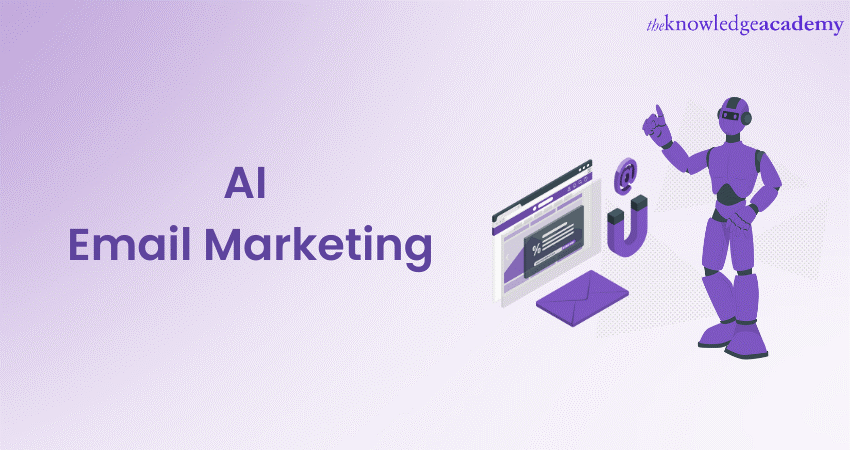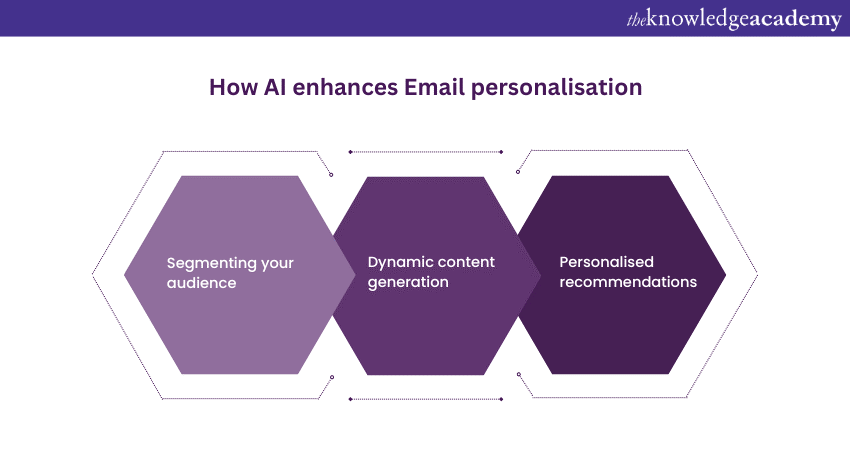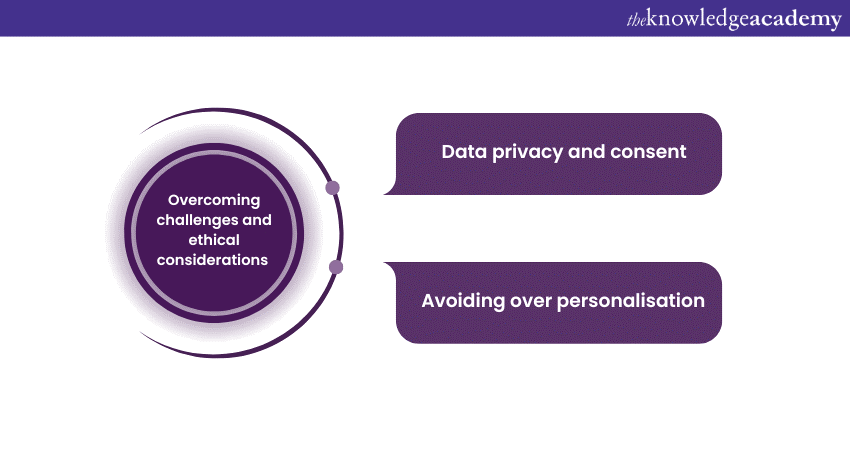We may not have the course you’re looking for. If you enquire or give us a call on 01344203999 and speak to our training experts, we may still be able to help with your training requirements.
We ensure quality, budget-alignment, and timely delivery by our expert instructors.

In today's fast-paced marketing world, where personalisation and efficiency are essential, the collaboration between Artificial Intelligence (AI) and Email Marketing has become a game-changer. As businesses navigate the terrain of personalisation and operational efficiency, the synergy between AI and Email Marketing, often called "AI Email Marketing," has emerged as a transformative force.
This groundbreaking collaboration of AI and Email Marketing holds the potential to provide personalised content to individual recipients with an unmatched degree of accuracy and efficiency. It encompasses tasks ranging from creating compelling subject lines that intrigue recipients to open their emails, all the way to remarkably precise predictions of user behaviour. In this blog, we will look at how AI Email Marketing redefines engagement and conversion and assists in modern marketing methods.
Table of Contents
1) Understanding AI in Email Marketing
2) How AI enhances Email personalisation
3) Predictive analytics: optimising Email Campaigns
4) AI-driven subject lines and content
5) Improved customer engagement and retention
6) Overcoming challenges and ethical considerations
7) The future of AI in Email Marketing
8) Conclusion
Understanding AI in Email Marketing
As businesses strive to forge meaningful connections with their audiences, AI has stepped onto the stage with remarkable prowess, reshaping how Email Campaigns are conceived, executed, and optimised. Let us go over some basics about AI Email Marketing in this section:
Definition of AI in Email Marketing
At its core, "AI Email Marketing" encapsulates the integration of AI technologies into the various aspects of creating, delivering, and optimising Email Campaigns. AI algorithms and Machine Learning (ML) models process vast amounts of data to identify individual recipients' patterns, preferences, and behaviours.
This enables marketers to tailor content, subject lines, send times, and recommendations with unparalleled precision, ultimately enhancing user engagement and conversion rates. The AI's real-time capacity to learn and adapt empowers marketers to craft hyper-personalised experiences, rendering each interaction meaningful and resonant.
Benefits of AI in Email Marketing
a) Enhanced personalisation: AI's ability to analyse user data enables segmenting audiences based on preferences, demographics, and behaviours. This level of granularity empowers marketers to deliver content that truly resonates, leading to higher open rates, click-through rates, and conversions.
b) Time and resource efficiency: Automating routine tasks like list segmentation, content creation, and A/B testing frees up valuable human resources. This enables marketers to focus on strategy and creativity, optimising overall campaign performance.
c) Predictive analytics: AI algorithms can predict user behaviour, such as the likelihood of opening an email or purchasing. This predictive insight enables marketers to tailor content and timing for maximum impact, boosting engagement.
d) Dynamic content generation: AI-driven tools can generate dynamic content that adapts to each recipient's preferences and behaviours. This ensures that each recipient receives content that aligns with their interests, increasing engagement and relevance.
e) A/B testing optimisation: AI can analyse A/B test results in real-time, quickly identifying which elements resonate most with different segments. This data-driven approach enables rapid optimisation and refinement of campaigns.
f) Constant learning and adaptation: AI algorithms continuously learn from user interactions and campaign outcomes. This allows campaigns to evolve and improve, adapting to changing audience behaviours and preferences.
Learn how to establish a goal for your Email Campaigns sign up for our Email Marketing Course now!
How AI enhances Email personalisation
AI has transformed the once-generic email campaign into a hyper-personalised experience through advanced algorithms and data analysis. Let's explore the key aspects through which AI enhances email personalisation.

Segmenting your audience
AI-powered segmentation goes beyond traditional demographic categorisation. It delves into intricate details by analysing user behaviours, preferences, and engagement history. This enables marketers to create dynamic audience segments that reflect nuanced interests, ensuring that each email resonates on a personal level.
For instance, AI can identify elements like "frequent purchasers," "cart abandoners," or "engaged but inactive users." Such detailed segmentation allows tailored content delivery, catering to diverse needs and maximising engagement.
Dynamic content generation
Traditional Email Campaigns often entail manual content creation, limiting the scope for personalization. AI disrupts this norm by enabling dynamic content generation. With the ability to adapt email elements based on recipient data, AI ensures that each email showcases relevant products, services, or information.
This dynamic approach enhances user experience by delivering content aligned with individual preferences. For instance, an AI-powered email can showcase product recommendations based on previous purchases, fostering a sense of familiarity and relevance.
Personalised recommendations
AI-driven personalisation thrives on understanding user preferences and predicting their next steps. By analysing historical interactions, AI can predict what products, services, or content a recipient will likely be interested in. This predictive insight powers personalised recommendations, amplifying cross-selling and upselling opportunities.
For instance, an email suggesting complementary products to a recent purchase leverages AI's ability to understand customer journeys, enriching the customer experience while boosting conversions.
Predictive analytics: Optimising Email Campaigns
The integration of predictive analytics through AI has reshaped the very essence of campaign optimisation. Predictive analytics harnesses the power of data to anticipate user behaviour and preferences, allowing marketers to fine-tune their strategies for maximum impact. Let's understand the aspects of predictive analytics optimising Email Campaigns.
Analysing user behaviour
Predictive analytics in Email Marketing begins with a deep dive into user behaviour data. AI algorithms meticulously scrutinise past interactions, from open rates to click-through rates and conversion actions. By uncovering patterns and trends, predictive analytics offers invaluable insights into what captures users' attention and prompts engagement.
This analysis forms the bedrock for crafting resonating email content, ensuring that each campaign is rooted in data-driven understanding rather than guesswork.
Predicting open and click rates
One of the cornerstones of email success lies in the open and click rates. Predictive analytics raises these metrics by forecasting how recipients engage with emails. By factoring in historical data, demographics, and external factors, AI algorithms can estimate the likelihood of an email being opened and specific links being clicked. With this foresight, marketers can tailor subject lines, content, and calls to action with surgical precision, boosting engagement rates.
Sending time optimisation
The timing of an email can significantly impact its effectiveness. Predictive analytics addresses this challenge by identifying the optimal send times for each recipient. By analysing when users are most active, AI can schedule emails to arrive when they will likely check their inboxes.
This enhances the chances of emails being noticed and engaged with, maximising the impact of campaigns. Time optimisation is especially crucial in a global audience scenario, as it bridges time zone gaps and ensures emails arrive when they are most likely to be acted upon.
Predictive analytics infuses Email Marketing with a predictive edge, making campaigns more proactive and less reliant on reactive adjustments. By understanding user behaviour, predicting open and click rates, and optimising sending times, AI-powered predictive analytics elevates campaigns from mere communication to strategic interactions.
Discover the basics of marketing and learn how to apply them with efficiency by signing up for our Marketing Training now!
AI-driven subject lines and content
AI-powered subject lines and content work together harmoniously to enhance the overall experience. Through data analysis and machine learning, AI brings subject lines and content to life, captivating recipients from the moment they see them in their inboxes. Let's explore the key dimensions through which AI transforms subject lines and content.
Subject line optimisation
Crafting an alluring subject line that entices recipients to open an email is an art form. However, AI amplifies this artistry by analysing historical open rates, A/B test results, and linguistic nuances to predict which subject lines will most likely capture attention.
Through machine learning, AI algorithms identify patterns in subject lines that have historically led to higher engagement. This enables marketers to compose subject lines that are not just creative but data-backed, ensuring that the email's first impression lingers.
Content generation and A/B testing
Content creation, often considered a labour-intensive process, finds a harmonious companion in AI-driven automation. AI can generate content dynamically by analysing recipient data and tailoring messages accordingly. From product recommendations to personalised greetings, AI ensures that each recipient receives content that resonates with their interests and behaviours.
Moreover, AI facilitates A/B testing at an unprecedented scale. It can simultaneously test multiple content variations, rapidly analysing recipient responses to determine which elements yield the most favourable outcomes. This expedites the testing process and refines content strategies for maximum engagement.
Improved customer engagement and retention
The combination of AI and Email Marketing has provided businesses with a powerful tool for better customer engagement and retention in the constantly changing field of customer relationship management. AI-driven strategies have redefined how brands interact with their audience, nurturing relationships beyond mere transactions. Let's understand the core aspects through which AI helps customer engagement and retention.
AI-powered drip campaigns
Drip campaigns, carefully orchestrated sequences of emails, have long been a staple in email marketing. However, AI adds a layer of sophistication by tailoring these campaigns to individual recipient behaviours and preferences. AI-powered drip campaigns analyse recipient interactions, segment data, and adapt email content accordingly.
For instance, if a recipient engages with certain products but hasn't made a purchase, the AI can trigger a sequence of emails showcasing related products or offering discounts. This personalised approach keeps recipients engaged by aligning with their interests and needs, increasing the likelihood of conversions and fostering a sense of brand loyalty.
Customer lifecycle management
A customer's journey from initial contact to brand advocacy is a nuanced expedition. AI enriches this journey by optimising touchpoints throughout the customer lifecycle. AI can identify pivotal moments such as cart abandonment or prolonged inactivity by analysing user behaviours.
It then triggers emails designed to re-engage customers and guide them back into the fold. Moreover, AI helps segment customers into categories like "new leads," "active customers," and "loyal advocates." Each segment receives tailored emails that cater to their specific needs and interactions, nurturing relationships and enhancing brand affinity.
Overcoming challenges and ethical considerations
As the integration of AI and Email Marketing deepens, it brings to light particular challenges and ethical considerations that demand thoughtful navigation. The synergistic potential of AI in Email Marketing is vast, but it must be utilised responsibly to ensure both effectiveness and respect for recipients' privacy. Let's look at overcoming challenges and ethical considerations in this landscape.

Data privacy and consent
Data privacy and consent are the cornerstone of ethical Email Marketing in the AI era. Collecting and utilising recipient data for personalisation requires adherence to stringent data protection regulations such as GDPR and CCPA. Marketers must ensure transparent communication regarding data collection practices and obtain explicit consent from recipients.
AI's ability to process vast amounts of personal data magnifies the importance of safeguarding this information. Responsible data management involves secure storage, encryption, and strict access controls to prevent breaches and unauthorised usage.
Avoiding over personalisation
While personalisation is a potent tool, there's a fine line between tailored content and over-personalisation. AI's depth of data analysis can sometimes lead to messages that feel invasive or overly familiar to recipients. Striking the right balance requires understanding recipients' comfort levels and respecting boundaries.
Over-personalisation can erode trust and prompt recipients to disengage or even mark emails as spam. AI algorithms should be calibrated to ensure that personalisation adds value without crossing into uncomfortable territory.
The future of AI in Email Marketing
With the continuous advancements in AI, its integration with Email Marketing holds the potential to reshape strategies, amplify engagement, and foster deeper connections with audiences. Let's explore the potential aspects of the future of AI in Email Marketing.
Integration with other marketing channels
The future of AI in Email Marketing extends beyond the boundaries of the inbox. AI-powered insights from Email Campaigns can seamlessly inform and optimise other marketing channels.
For instance, data from email interactions could enhance social media targeting, refine content strategies, and influence website personalisation. Integrating AI-driven insights across marketing channels creates a unified and data-driven approach, ensuring consistent messaging and enhancing the overall customer experience.
Evolution of AI capabilities
As AI capabilities expand, so does its potential within email marketing. The future will likely witness AI algorithms evolving to anticipate user preferences and behaviours at an even deeper level. With AI crafting messages that reflect past interactions, inferred emotional states, and real-time context, hyper-personalisation could become more intuitive. Additionally, natural language processing could enable AI to draft email content more humanly, fostering authenticity and engagement.
AI's predictive abilities could grow sharper, allowing marketers to foresee trends and customer journeys with heightened accuracy. This could lead to campaigns anticipating customer needs and desires before recipients fully know them. AI could also play a crucial role in real-time content adaptation, ensuring email content adjusts to recipients' changing preferences and behaviours dynamically.
Learn to create interesting and effective Marketing content. Sign up for our Content Marketing Masterclass now!
Getting started with AI Email Marketing
Embarking on the journey of AI Email Marketing requires thoughtful planning, from choosing the right tools to seamless implementation. Here's a comprehensive guide to help you get started.
Selecting the right AI Email Marketing tools
a) Assess your needs: Before diving into AI tools, evaluate your Email Marketing goals and challenges. Determine which areas of your campaigns could benefit the most from AI-driven optimisation, whether personalisation, analytics, or content creation.
b) Research available solutions: Explore the diverse range of AI tools tailored for email marketing. Look for tools that align with your requirements and offer predictive analytics, dynamic content generation, and automated segmentation features.
c) User-friendly interface: Opt for tools with intuitive interfaces that facilitate ease of use. A user-friendly platform streamlines the learning curve and ensures your team can efficiently leverage AI capabilities.
d) Scalability: Consider tools that can grow with your needs. As your Email Marketing efforts expand, scalability becomes crucial to accommodate increasing volumes of data and campaigns.
e) Integration compatibility: Ensure that the chosen AI tools can seamlessly integrate with your existing Email Marketing platform and other marketing tools you use. Integration fosters data flow and ensures a unified approach.
Implementing AI in existing strategies
a) Define clear objectives: Clearly outline your objectives for implementing AI in email marketing. Whether improving open rates, enhancing personalisation, or boosting conversions, having specific goals guides the implementation process.
b) Data collection and segmentation: Effective AI utilisation hinges on quality data. Ensure your data is accurate, up-to-date, and well-segmented. AI relies on precise data to generate meaningful insights and drive personalisation.
c) Training and familiarisation: Familiarise your team with the selected AI tools through training sessions. Understand the functionalities, workflows, and best practices to leverage the tools effectively.
d) Test and refine: Begin with smaller-scale AI-driven campaigns to gauge the impact and refine your approach. Experiment with different AI features and strategies to find the optimal mix for your audience.
e) Iterative improvement: AI is an evolving field. Continuously analyse campaign results and adjust your strategies based on AI-generated insights. Embrace a culture of iterative improvement to maximise AI's potential.
f) Monitor ethical considerations: While implementing AI, remain mindful of ethical considerations. Ensure that data privacy, consent, and over-personalisation are rigorously addressed to build trust with your audience.
g) Collaborate across teams: AI Email Marketing involves cross-functional collaboration. Engage marketing, data analytics, and IT teams to harness AI's power for successful campaigns.
Conclusion
AI Email Marketing offers unprecedented potential with AI-driven personalisation, predictive insights, and ethical considerations shaping the future. Utilising AI's transformative capabilities to create campaigns that effectively engage, resonate with, and adapt to the ever-changing needs of your audience can provide positive results.
Upcoming Digital Marketing Resources Batches & Dates
Date
 Email Marketing Course
Email Marketing Course
Fri 4th Apr 2025
Fri 6th Jun 2025
Fri 8th Aug 2025
Fri 3rd Oct 2025
Fri 5th Dec 2025






 Top Rated Course
Top Rated Course



 If you wish to make any changes to your course, please
If you wish to make any changes to your course, please


